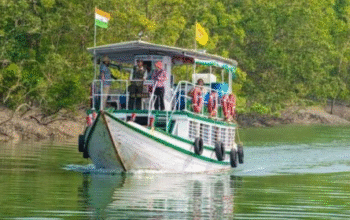What are eco-friendly destinations? An eco-friendly destination is one that takes sustainability, environmental protection, and responsible tourism to heart. It involves efforts toward waste reduction, resource conservation, and wildlife and ecosystem protection.
Why do I need to choose eco-friendly destinations? The best eco-friendly destinations promote environmental conservation, help local communities, and give the traveler a chance to appreciate nature without causing its degradation.
How can I find environmentally friendly destinations? Research destinations with a reputation for sustainable practices, consult eco-tourism websites, or utilize apps such as Green Key, EarthCheck, or Green Globe to identify destinations that are certified as eco-friendly.
What is eco-tourism? Eco-tourism emphasizes responsible travel to natural areas that conserve the environment and enhance the well-being of local people. Eco-tourism often involves an eco-lodge, conservation programs, and cultural experiences.
Some examples of green destinations are: Costa Rica, Iceland, New Zealand, Bhutan, and Norway. These places are known to have eco-friendly tourism practices in place and always try to support sustainability.
What can I do to make sure my trip is eco-friendly? Pick a hotel or resort that’s been certified, reduce carbon emissions by using local public transportation, eliminate waste, and support local businesses practicing eco-friendly initiatives.
What certifications should I look for in eco-friendly destinations? Look for certifications like Green Key, EarthCheck, Green Globe, or Eco-Label, which indicate a commitment to sustainability in areas like waste management, energy efficiency, and wildlife conservation.
How can I support local communities in eco-friendly destinations? Choose locally owned accommodations, participate in community-led tours, buy locally made products, and avoid businesses that exploit natural resources or wildlife.
What is sustainable tourism? Sustainable tourism is travel that minimizes environmental impact while benefiting local communities economically and culturally, without compromising the ability of future generations to enjoy the same experiences.
How does sustainable tourism differ from eco-tourism? While both focus on environmental responsibility, sustainable tourism also emphasizes long-term socio-economic development for local communities, while eco-tourism focuses more on environmental conservation and minimizing the tourist impact on nature.
What activities can I do in eco-friendly destinations? Eco-friendly destinations often offer hiking, wildlife watching, cycling tours, stays in an eco-lodge, and participation in conservation projects. Many also encourage low-impact activities such as kayaking, bird watching, or cultural exchanges.
Eco-friendly travel helps support the local business economy and offers fair wages for people involved. This practice contributes to sustainable development within a community, besides educating it about issues such as conservation and providing money to support local preservation.
How can I minimize my carbon footprint while traveling? Use public transport, walk or bike instead of driving, fly direct to reduce fuel consumption, and choose eco-friendly accommodations. Additionally, consider offsetting your carbon footprint by supporting carbon-offset projects.
What role does transportation play in eco-friendly destinations? Transportation significantly contributes to the sustainability of a destination. Eco-friendly destinations encourage tourists to walk, cycle, or use electric or hybrid vehicles. They also use public transport systems with less emission.
Are there any environmentally friendly accommodations? Yes, some of the environmental-friendly accommodations include eco-lodges, green hotels, and hostels that have sustainability initiatives, as well as farms or homestays that aim to reduce energy consumption, water usage, and waste.
What are eco-lodges, and why should I choose them? Eco-lodges are accommodations that are designed with sustainability in mind, using renewable energy, water-saving devices, and low-impact building materials. They also often promote local culture and use locally sourced food.
How can I support sustainable food practices while traveling? I can eat at farm-to-table restaurants, select organic and locally sourced foods, and avoid restaurants that waste resources or contribute to overfishing and harmful agricultural practices.
What is “over-tourism,” and why is it a problem for eco-friendly destinations? Over-tourism occurs when a destination receives too many visitors, leading to environmental degradation, overcrowding, and exploitation of local communities. Eco-friendly destinations aim to manage visitor numbers to prevent this.
How can I reduce my contribution to over-tourism? One can travel in off-peak seasons, take less visited destinations, or engage in alternative tourism to distribute the impacts of tourism in a more spread manner.
What should I know about wildlife conservation in eco-friendly destinations? Eco-friendly destinations protect the wildlife through responsible wildlife tours, wildlife sanctuaries, and educational programs. I should avoid things like animal performances, unethical safaris, and any activity involving exploitation of wildlife.
Are there environmentally friendly destinations that emphasize water conservation? Yes, there are destinations such as water-scarce regions that encourage water conservation through efficient irrigation systems, water recycling programs, and eco-friendly resorts that use minimal water.
How do environmentally friendly destinations manage waste? Many environmentally friendly destinations minimize waste through recycling programs, composting, reduction of plastic use, and encouraging tourists to bring reusable items such as water bottles and shopping bags.
How can I become a responsible wildlife tourist? Avoid tours that offer activities involving interaction with or movement of wildlife; instead, only support businesses emphasizing conservation and rehabilitation. How would I know the destination is sustainably eco-friendly? Look out for certifications of sustainability, as well as transparency from the destination in such practices. There should be strong involvement from local governments in the conservation and sustainability efforts for the destination, and the focus should be towards environmental, social, and economic sustainability.
Are there eco-friendly destinations for beach vacations? Yes, destinations like the Galapagos Islands, Seychelles, and Bali promote eco-friendly beach tourism by protecting coral reefs, promoting responsible diving, and preventing pollution.
How do I find eco-friendly destinations for adventure travel? Research destinations that focus on conservation and sustainable adventure activities like hiking, biking, and kayaking. National parks and protected areas often offer eco-friendly adventure travel opportunities.
Renewable energy plays a significant role in eco-friendly destinations. Most eco-friendly destinations rely on renewable energy sources, such as solar or wind power, to reduce dependence on fossil fuels and minimize the impact on the environment. Most eco-lodges and hotels also use energy-efficient technologies.
How can I help support conservation at eco-friendly destinations? Engage in eco-friendly activities, give to local conservation projects, and participate in environmental projects. Many of the eco-destinations will provide opportunities for visitors to contribute to conservation work.
What is community-based tourism? Community-based tourism is a concept in which tourism activities are run by local communities and in which benefits of tourism trickle down to both the economic and cultural aspects of the community. It focuses on local ownership and sustainability.
How do I find sustainable travel operators? Look for tour operators with sustainability certifications, or those who focus on eco-friendly practices like low-carbon transportation, minimal waste, and partnerships with local conservation groups.
How do eco-friendly destinations support local culture? Many eco-friendly destinations work to preserve local traditions and cultural practices, offering experiences that engage travelers with authentic local communities and practices without exploiting them.
What does eco-tourism do to global conservation? Eco-tourism raises environmental awareness, provides income for conservation projects, and supports efforts toward the protection of natural resources and biodiversity worldwide.
How can I avoid contributing to “greenwashing” in tourism? Research a destination or business to ensure that it is indeed environmentally friendly. Third-party certifications and other travelers’ experiences at the destination are also helpful.
What are the greatest eco-friendly destinations to hike? I will mention Switzerland Alps, New Zealand, Costa Rica, and Canadian Rockies known for their great hiking trails combined with environmental care and eco-accommodations.
What can I bring on a green trip? Pack reusable supplies, such as a water bottle, shopping bag, cutlery, toiletries in environmental-friendly packaging, and clothes made of natural fibers rather than disposable goods.
How can I reduce my carbon footprint when flying to eco-friendly destinations? Fly direct to reduce emissions, offset your carbon footprint through airlines or carbon offset programs, and consider using eco-friendly airports or services that promote sustainability.
While making a tour being an eco-warrior is indeed possible at some UNESCO World Heritage sites that practice conservation and the development of a sustainable tourism concept. So you must be mindful of selecting appropriate ethical tours along with strictly observing the site regulations in protecting both cultural and natural values.
How do I find some green places to stay in the cities? Look for hotels, hostels, or bed-and-breakfasts that are eco-certified; use energy-efficient technologies; promote water conservation; and minimize waste. Green hotels as well as urban eco-lodges are appearing everywhere.
What is the role of national parks in eco-tourism? National parks often take the lead on various eco-tourism initiatives – offering visitors opportunities to experience natural wonders while promoting conservation, research, and sustainable tourism practices.
How can I practice sustainable travel while traveling for business? Reduce the environmental impact of business trips by choosing eco-friendly hotels, using public transportation, minimizing waste, and considering virtual meetings to reduce unnecessary travel.
Are there eco-friendly destinations for winter sports? Yes, places like the Swiss Alps, Banff, and Japan’s Niseko region promote eco-friendly winter sports with energy-efficient resorts, waste reduction programs, and sustainable snow-making practices.
How can I help preserve endangered species while traveling? Choose ethical wildlife tours, avoid supporting activities that exploit animals, and donate to or volunteer with organizations that protect endangered species.
What are the top eco-friendly destinations in Africa? Countries like Kenya, Tanzania, and Rwanda are known for their eco-friendly tourism efforts, offering safaris and wildlife conservation programs that benefit both the environment and local communities.
How do I practice sustainable tourism in remote locations? Travel light, respect customs, support locals, and never leave a mark when visiting some of the world’s most remote places or protected spaces.
What are the most family-friendly ecotourist destinations? Look to Costa Rica, Iceland, and New Zealand for family ecotourism experiences that provide wildlife viewing, adventure activity, and green lodging.
How can I influence others to travel more ecologically? Share your sustainable travel experiences on social media, promote responsible tourism practices, and teach your friends and family about the benefits of traveling to eco-friendly destinations.
How can I measure my impact on the environment from traveling? Use carbon calculators to estimate the emissions of your travel, and work towards reducing it by using more sustainable modes of transportation and reducing waste during your trip.
What should I know regarding the ethical handling of animals about eco-tourism? Any wildlife experience must be selected keeping in mind their conservation and also the welfare of animals. Areas that offer petting zoos, elephant rides or animal performances need to be avoided.
Yes, many travel agencies specialize in sustainable travel, offering eco-friendly tours, accommodations, and experiences in destinations around the world. Look for agencies that are committed to conservation and sustainable tourism.
How can I be more environmentally friendly in my daily life as a traveler? Practice sustainable habits like reducing waste, conserving water, and minimizing plastic use. Support businesses and destinations




